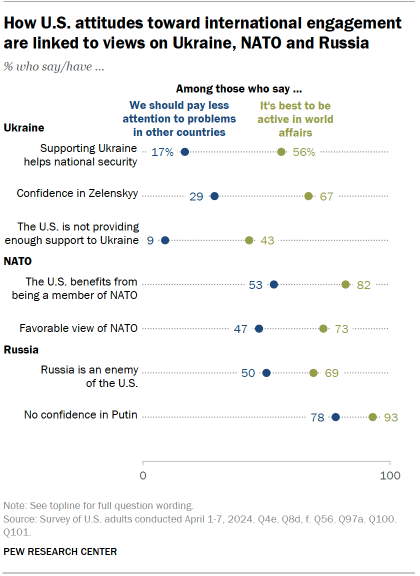Growing Partisan Divisions Over NATO and Ukraine
Many Americans say the influence of China, Russia and Iran is rising; increasing shares see U.S. and European nations as in decline
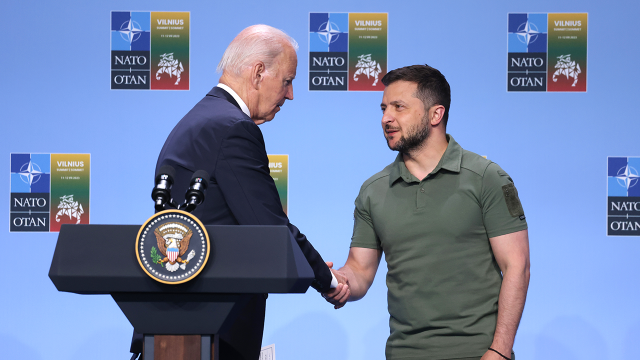
As NATO approaches its 75th anniversary, Americans are increasingly divided in their views about the alliance. Most continue to believe the United States benefits from its membership, but partisan differences on ratings of NATO have widened in recent years.
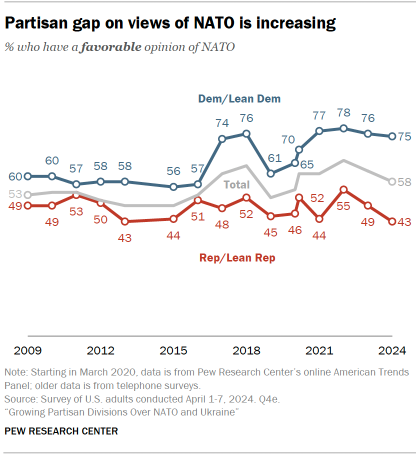
Three-quarters of Democrats and Democratic-leaning independents rate the organization favorably, while only 43% of Republicans and Republican leaners agree – down from 55% in a 2022 survey conducted soon after Russia’s invasion of Ukraine.
Attitudes toward the war in Ukraine have evolved to reflect the partisan polarization found across so many issues in U.S. politics. Democrats and Republicans differ sharply on views about aid to Ukraine, ratings of Ukrainian President Volodymyr Zelenskyy, and whether supporting Ukraine helps or hurts U.S. interests.
The share of Americans who believe the U.S. is not providing enough support to Ukraine has risen slightly in recent months, following setbacks for Ukraine on the battlefield and prolonged congressional debate over sending aid. (The survey was conducted before President Joe Biden signed into law an aid package sending nearly $61 billion to the Ukrainian war effort.)
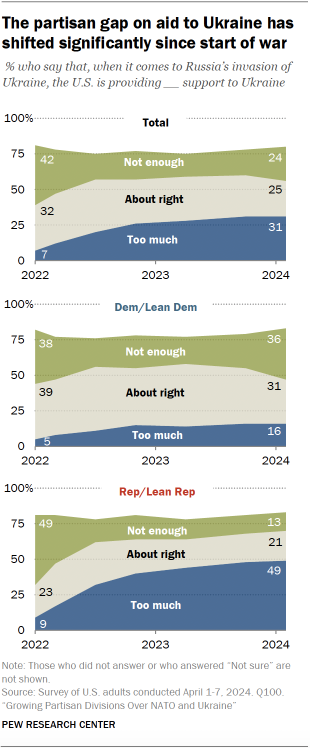
Roughly one-quarter of Americans (24%) now say the U.S. is not providing enough aid, up from 18% in November 2023, when we last asked this question. Still, more Americans (31%) think the U.S. is providing too much aid, and 25% believe it’s giving the right amount.
However, views on this issue vary considerably by party. While the share of Democrats who believe the U.S. is not doing enough to help Ukraine declined after the initial onset of the war, it has increased more recently. Currently, 36% of Democrats say the U.S. is not providing enough aid.
In contrast, just 13% of Republicans say the U.S. is not giving enough support to Ukraine, while 49% believe it is giving too much. At the beginning of the war, Republican attitudes were essentially the reverse: 49% said the U.S. was not providing enough aid and 9% said it was providing too much. Among Republicans, conservatives are more likely than moderates and liberals to say the U.S. is providing too much aid to Ukraine.
In addition to shifting views about NATO and Ukraine over the past few years, Americans have increasingly come to believe that U.S. power is declining on the global stage: 54% say the country’s influence has been getting weaker recently, up from 47% two years ago. The shares saying the same about the United Kingdom, France and Germany – key U.S. allies in Europe – have also increased since 2022.
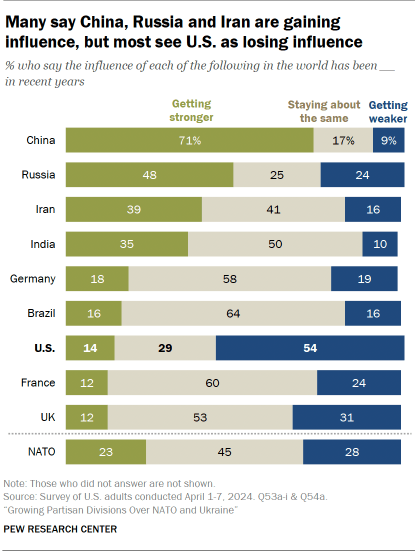
Meanwhile, about four-in-ten or more see China, Russia and Iran – nations often considered adversaries of the U.S. – as increasingly influential, including a 71% majority who say this of China. And about a third say India’s influence is getting stronger.
Republicans are more likely than Democrats to believe China, Russia and Iran are gaining strength. They are also more likely to believe the U.S., France and Germany are becoming weaker.
These are among the findings from a Pew Research Center survey conducted April 1-7, 2024, among 3,600 U.S. adults.
Below we describe some of the key findings from the survey, which explored attitudes toward NATO, Ukraine, trans-Atlantic relations, Russia and the shifting balance of power in global politics. For more in-depth analysis of these topics, read:
- Chapter 1: Views of Ukraine and U.S. involvement with the war
- Chapter 2: Americans’ opinions of NATO
- Chapter 3: Views of trans-Atlantic allies and U.S.-Europe relations
- Chapter 4: Views of Russia and Putin
Ukraine
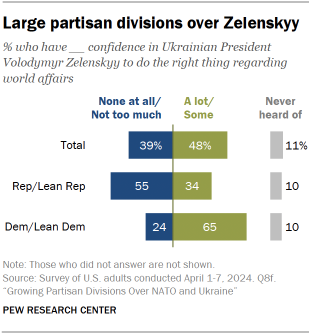
- There is no public consensus on whether supporting Ukraine is in America’s national interests: 36% say it helps U.S. national security, 36% say it hurts and 24% believe it has no impact. Democrats are particularly likely to think it helps, while Republicans are especially likely to say it hurts.
- Concerns about Russia defeating Ukraine and Russia invading other countries in the region are higher today than in September 2022, the last time we asked this question. These concerns are more common among Democrats than Republicans.
- Opinions about Zelenskyy also divide sharply along partisan lines. A 55% majority of Republicans now lack confidence in Zelenskyy to do the right thing in world affairs, up from 48% a year ago. In contrast, 65% of Democrats say they are confident in the Ukrainian leader, although this is down from 71% in 2023.
NATO and trans-Atlantic relations
- In addition to partisan divisions over NATO, there are also substantial differences by education. For instance, 73% of Americans with a postgraduate degree have a favorable view of NATO, compared with just 51% of those with a high school degree or less education.
How much do Americans know about NATO?
Read the results of our NATO knowledge quiz.
- 66% of Americans believe the U.S. benefits a great deal or fair amount from being a NATO member; 51% of Republicans hold this view, compared with 81% of Democrats.
- Majorities of Americans have favorable views of the UK (70%), France (64%) and Germany (64%); Democrats are more likely than Republicans to see these key U.S. allies positively.
- Large majorities of both Democrats and Republicans believe economic and trade ties, security and defense ties, and shared democratic values are important for strong relations between the U.S. and Europe. However, while 45% of Democrats believe shared democratic values are very important, only about a third of Republicans (31%) say the same.
- Despite overall positive views of European allies and the nature of trans-Atlantic relations, roughly half of U.S. adults (47%) say European allies need to increase their defense spending. Older Americans and conservative Republicans are particularly likely to believe this.
Russia
- Americans became significantly more likely to consider Russia an enemy after the February 2022 invasion of Ukraine. In January 2022, 41% considered Russia an enemy of the U.S.; two months later, 70% held this view. Today, roughly six-in-ten (61%) see Russia as an enemy.
- Compared with the other issues in this study, partisan divisions over Russia are relatively muted. Democrats (67%) are more likely to describe Russia as an enemy, but most Republicans (58%) share this view. In 2022, these partisan differences were not as wide.
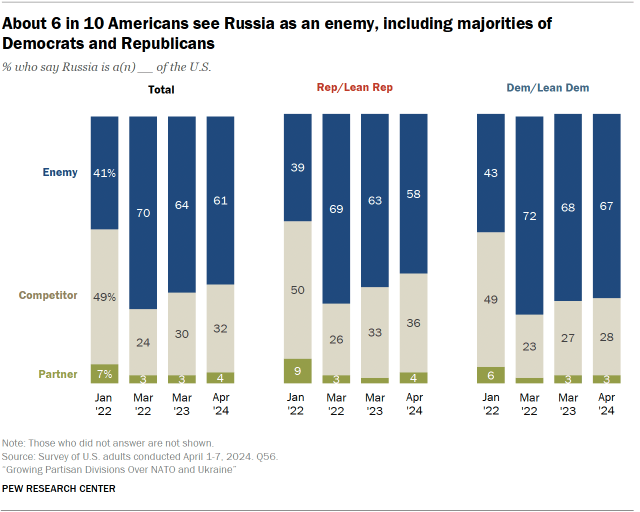
- Attitudes toward Russian President Vladimir Putin remain extremely negative among Americans: 88% say they do not have confidence in him to do the right thing in world affairs.
A shifting balance of global power
- Since 2022, Americans have become more likely to believe China, India and Russia are growing stronger in world affairs. In contrast, they have become more likely to say France, Germany, the UK and the U.S. are losing influence on the world stage.
- Two-thirds of Republicans think the U.S. is losing influence; 44% of Democrats agree. The share of each partisan group who say U.S. influence is declining has increased since 2022.
- Large majorities in both parties believe China’s power is rising, although Republicans (78%) are somewhat more likely than Democrats (68%) to hold this view.
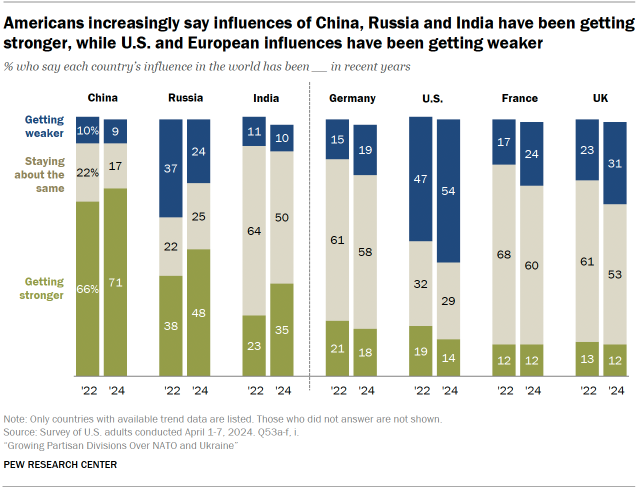
International engagement and foreign policy issues
- Many questions on the survey correlate with general views about international engagement. For example, 56% of those who think it’s best for the U.S. to be active in world affairs say supporting Ukraine helps American national security. That share is just 17% among those who say the U.S. should pay less attention to problems in other countries and concentrate on domestic problems.
